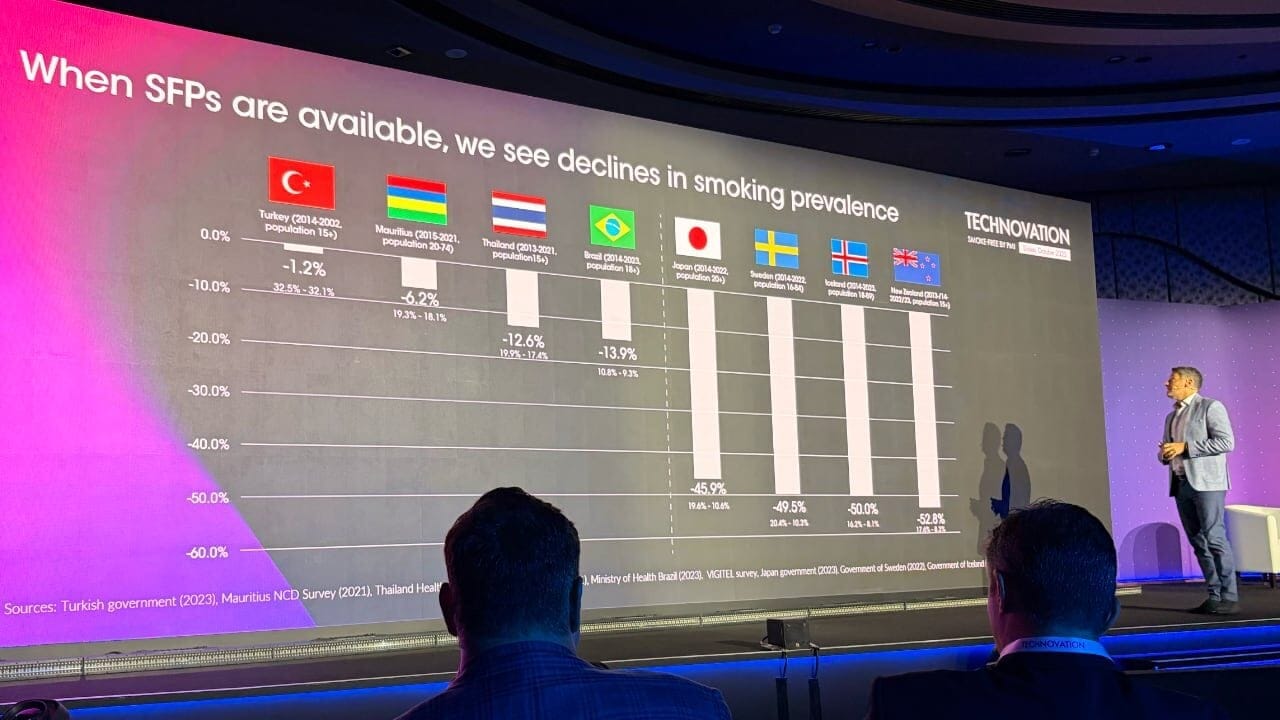It sounds like the plot twist no one saw coming—Philip Morris International (PMI), the maker of Marlboro, says it wants to end smoking. Yes, the same company that sold billions of cigarettes now calls itself a science and innovation powerhouse on a mission for a smoke-free future.
Following the CEO interview at the Technovation 2025 event, Tommaso Di Giovanni, PMI’s VP of Communications and Engagement, took the stage to make a bold claim:
Our goal is to replace all cigarettes with smoke-free alternatives as soon as possible.
PMI says it has invested over $14 billion in research and development since launching its flagship heated tobacco product, IQOS.
The Science of Heat, Not Burn
IQOS doesn’t burn tobacco—it heats it. That means fewer harmful chemicals and no smoke. PMI’s scientists believe this simple shift could reduce health risks for millions of adult smokers who can’t or won’t quit nicotine entirely.
The numbers are striking: IQOS is now available in 97 countries, with over 41 million users, and the company claims 70% have quit cigarettes completely.
Those are self-reported stats, but even skeptics admit the device has changed smoking habits in countries like Japan, where cigarette sales have plummeted since IQOS hit the market.
FYI
Tobacco and nicotine are related, but they’re not the same thing — a bit like how coffee beans aren’t the same as caffeine.
Tobacco is the plant itself — leaves that are dried, fermented, and used to make cigarettes, cigars, and other products. It contains thousands of chemicals, many of which are toxic or carcinogenic when burned or processed. The real villains in tobacco smoke are substances like tar, carbon monoxide, and formaldehyde — the stuff that wrecks lungs, blood vessels, and pretty much everything else.
Nicotine, on the other hand, is a single chemical — a stimulant naturally found in the tobacco plant. It’s the reason people get addicted. Nicotine itself doesn’t cause cancer, but it hooks into your brain’s reward system, making you crave the next puff, vape, or pouch. In small doses, it can boost alertness or calm nerves; in large doses, it’s toxic.
Smoke-Free or Smoke-Screen?
The company’s transformation story is slick—but it’s not without its critics. While PMI presents itself as a reformed innovator, it still sells traditional cigarettes in many markets. That tension fuels ongoing debate: can the maker of cigarettes really lead a health revolution?
Regulators have taken cautious steps. In 2020, the U.S. FDA authorized IQOS to be marketed as a “reduced exposure”product—not “risk-free.” It’s a subtle but critical difference. Independent studies will need years to confirm whether reduced exposure truly means reduced harm.
The Four Pillars of Going Smoke-Free
PMI says progress depends on four key factors:
- Access – Adult smokers need to actually find smoke-free products where they live.
- Affordability – Prices should make switching realistic, not premium-only.
- Awareness – Smokers need to know these alternatives exist.
- Acceptance – The products must actually satisfy user habits and preferences.
Countries that meet these conditions—like New Zealand, Sweden, and Japan—are seeing some of the world’s fastest declines in cigarette smoking.
From Tobacco to Tech
At its research center in Neuchâtel, Switzerland, PMI employs over 1,400 scientists, engineers, and technicians. The lab’s design reflects the company’s philosophy: it’s themed around earth, air and water—but not fire. That missing element is intentional, symbolizing the company’s goal to eliminate combustion entirely.
PMI’s acquisition of Swedish Match in 2022 expanded its reach into oral nicotine products like Zyn, which has exploded in popularity across the U.S. and Europe. The message is clear: PMI wants to own the entire nicotine ecosystem—minus the smoke.
A Revolution Still Under Review
PMI’s shift could reshape the global nicotine market. But whether it reshapes public health remains to be seen. The company’s future depends on independent validation of its scientific claims—and public trust that it’s not just rebranding addiction with a tech gloss.
For now, PMI’s smoke-free crusade feels like one of the world’s most ambitious corporate reinventions. If it works, it could change history. If it doesn’t, it could go down as one of the most expensive PR experiments ever attempted.
Subscribe to our newsletter to get the latest updates and news















Member discussion